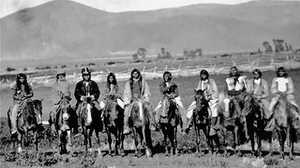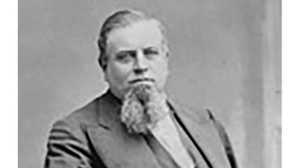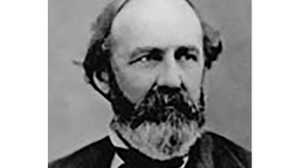Grenville Dodge

In 1859 young engineer Grenville Dodge met Abraham Lincoln by chance in Council Bluffs, Iowa. Dodge assured the future president that the Platte Valley would one day be the route of the Pacific Railroad. Seven years later he would be the chief engineer of that project.
Military Experience
Dodge joined the Union Army in the Civil War. In combat, he acquitted himself well. His work repairing Southern railroads for the Union ensured promotion to brigadier general under Ulysses S. Grant and won him the friendship of William Tecumseh Sherman. In 1864 Lincoln asked him to help decide the eastern terminus of the Pacific railroad. Dodge's former employer, Union Pacific head Thomas Durant, began inviting Dodge to join on as the company's chief engineer. The general repeatedly declined the offer, even when recuperating from a Rebel gunshot wound to the head. He did, however, give Durant classified information that helped Durant earn a tidy penny selling contraband Southern cotton.
War Against the Plains Indians
By 1865 Dodge commanded the U.S. Army's campaign against the Plains Indians. His tenacity, coupled with an espionage network in the Native American camps, drove tribes from the plains. The campaign was ultimately a failure; Dodge's subordinates committed atrocities that would ensure harsh reprisals. However, Dodge earned a different success. During a September 1865 expedition in the Black Hills, his men came under fire from a war party. Escaping down an uninterrupted ridge to the plains below, the General made a realization. "If we can save our scalps," Dodge told his guide, "I believe we've found a pass through which the Union Pacific can go." In May 1866 Dodge resigned his post and signed on as the Union Pacific's chief engineer, contingent upon Durant's promise he would be given complete control.
Duties -- and Conflicts
Dodge's hope of control was not to be. His main responsibilities as chief engineer were to examine terrain and draft the Union Pacific's route across it. If an obstacle arose in the route -- a chasm or a rock face -- Dodge designed the solution that would get them over or through it. As he led survey parties westward, Dodge planted division points and divided the land into lots. When the graders -- and then the work crews -- approached behind him, these spots quickly transformed themselves into towns. Durant was a meddler, always looking for a way to make more money, and he needed a finger in all these pies. Inconsistent as a manager and always looking out for himself, Durant had hired one of the best engineers for the job, but he only required a puppet to build cheaply and take foolish or foolhardy shortcuts. Contention between the two men would grow vicious over the years, especially after Durant imposed upon Dodge a consulting engineer named Silas Seymour. Dodge called him "the worst sneak I think I ever met." The reasons for Seymour's presence were espionage, second-guessing, and imposition of Durant's will. When Dodge ignored Seymour's interference, Durant grew furious, threatened to dismiss Dodge, or attempted to force him to resign.
A Second Job -- in Politics
In 1866 Dodge maneuvered his way into an Iowa congressional nomination and won. He would be criticized for neglecting official duties to survey Wyoming Territory for the railroad. Similarly, although Dodge spent much of his time on Capitol Hill lobbying on behalf of the Union Pacific, his absences away from the railroad earned heavy criticism from Durant.
Retirement
Shortly after building the Union Pacific track to its famous completion at Promontory Summit, Utah, Dodge resigned his position; he had no taste for a mere desk job. In 1870 he retired for a while to Council Bluffs. The general was a resolute family man who had kept frequent correspondence with wife Anna throughout construction.
Getting Away with a Windfall
Although Durant had once promised Dodge stock in his secret scam, the Crédit Mobilier, it had never materialized. Dodge had been eager to get in on the windfall, however, and purchased 100 shares in his wife's name. It turned a handsome profit -- 341 percent in just 18 months -- but when the Crédit Mobilier scandal erupted in 1872, Dodge would claim that his wife bought the shares from "her own resources," presumably housekeeping money. A congressional committee wanted to know more, but Dodge had no interest in going anywhere near Washington. Federal agents were sent out, but they could not manage to find him. Peter Dey, whom Dodge had once replaced as engineer, told Congress that Dodge was "a man of wonderful resources, and can live in Texas all winter, out of doors, if he wants to, where none of your marshals can go, and if he don't want to come he will not come." Dey proved correct.







